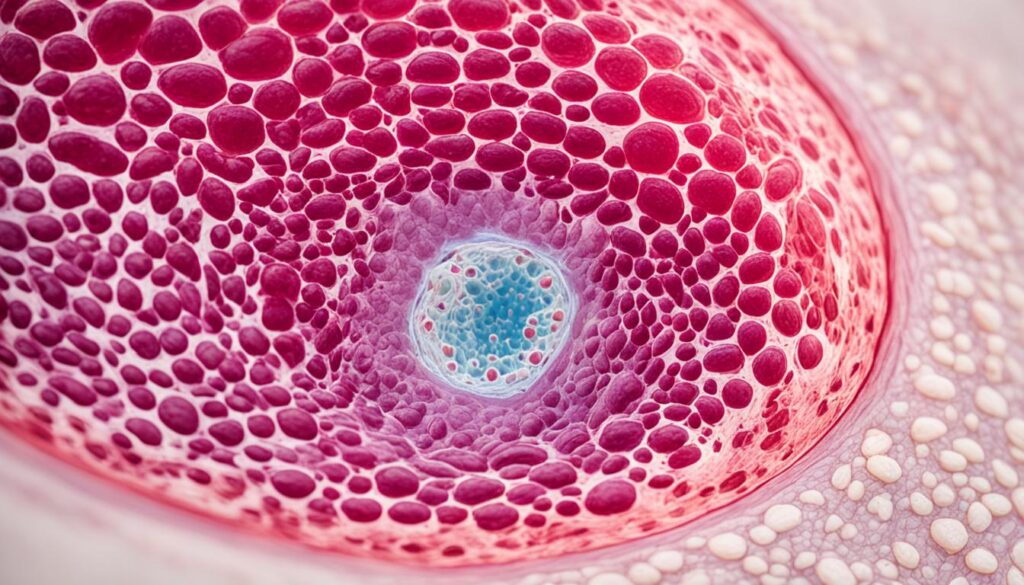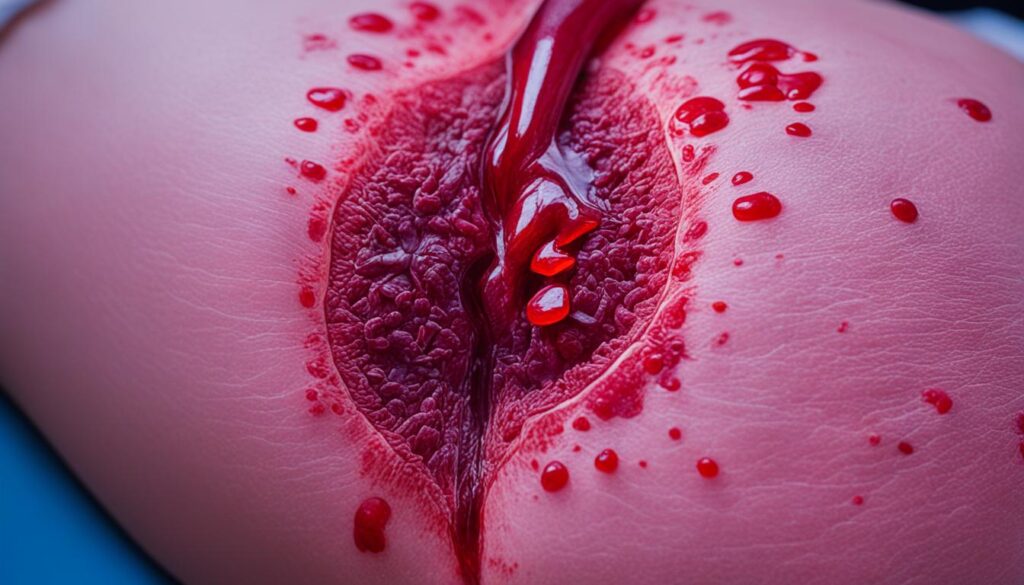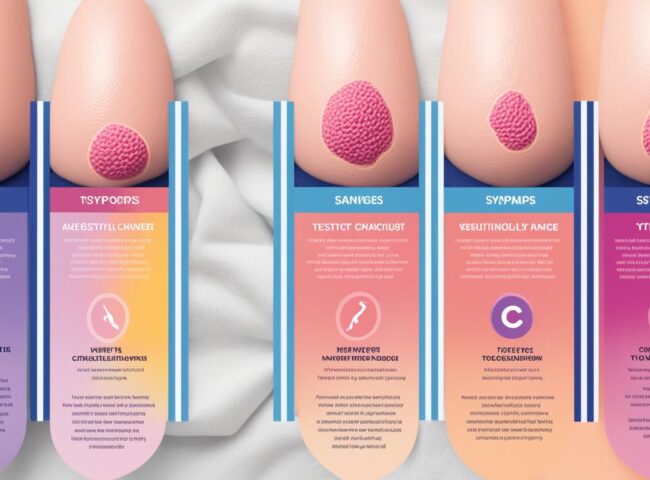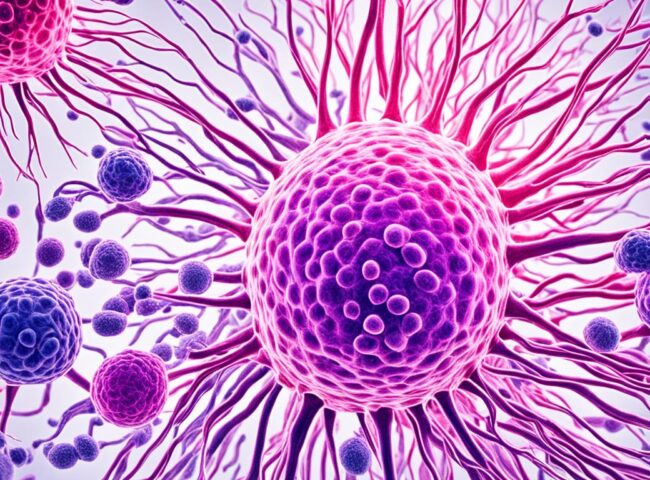Hemorrhoids are a common issue that can really affect your daily life. As a skilled copywriting journalist, I aim to give you a detailed guide on the best ways to treat hemorrhoids. We’ll cover the different types of hemorrhoids, signs to look out for, and ways to ease the pain and manage this issue.
Key Takeaways
- Understand the different types of hemorrhoids and their characteristics
- Recognize the common symptoms associated with hemorrhoids
- Explore a variety of treatment options, from home remedies to medical interventions
- Learn how to prevent and manage chronic hemorrhoids through lifestyle modifications
- Know when to seek medical attention for severe or persistent hemorrhoid-related issues
Understanding Hemorrhoids
Hemorrhoids, also known as piles, are a common issue that affects the anal and rectal area. They happen when veins in this area swell and get inflamed. This can lead to discomfort, itching, and even bleeding. It’s important to understand hemorrhoids to find the right treatment and manage them well.
What Are Hemorrhoids?
Hemorrhoids are swollen blood vessels in the lower rectum and anus. They can be inside the rectum or outside around the anus. The main reason for hemorrhoids is pressure on the veins in the anal area. This pressure is often from constipation, pregnancy, or sitting for a long time.
Types of Hemorrhoids
- Internal Hemorrhoids: These are inside the rectum and usually don’t hurt because they’re above the nerve endings. But, they can cause bleeding, itching, and discomfort.
- External Hemorrhoids: These are around the anus and can hurt more and be seen easily. They can cause a lot of discomfort, swelling, and even blood clots.
Knowing the type of hemorrhoids you have helps in choosing the right treatment. It’s best to see a doctor for a proper check-up to get the right diagnosis and treatment plan.

Symptoms of Hemorrhoids
Knowing the signs of hemorrhoids is key to getting the right treatment. Hemorrhoids show up in different ways. Spotting these signs helps people recognize the issue and find relief. Let’s look at the main hemorrhoid symptoms people might see.
Rectal bleeding is a common sign of hemorrhoids. You might see bright red blood on toilet paper, in the toilet, or on your stool. This bleeding is usually painless and happens during or after you go to the bathroom.
Anal discomfort is another common symptom. People may feel a dull ache, itching, or a burning feeling around their anus. This feeling can be mild or very bad, based on how bad the hemorrhoids are.
Sometimes, hemorrhoids can stick out, or prolapse. This makes a lump or swelling that can hurt and make going to the bathroom hard.
Not all hemorrhoids show as a visible lump or swelling. Internal hemorrhoids are inside the rectum and can’t be seen easily. Yet, they can still cause rectal bleeding and anal discomfort.
If you have any of these hemorrhoid symptoms, seeing a doctor is important. They can figure out what’s causing it and help you get better. Ignoring these signs can make things worse and lead to more serious problems.

hemorrhoids treatment, hemorrhoid relief, anal care, hemorrhoid symptoms, piles
Dealing with hemorrhoids can be tough, but there are many ways to get relief. You can try home remedies or seek medical help. Knowing your options helps you make the best choices for your anal health.
Sitz baths are a common and effective way to ease hemorrhoid pain. They use warm water to reduce swelling and help healing. Eating more fiber and drinking plenty of water also helps manage symptoms and prevent more problems.
For worse cases, you might need over-the-counter creams or ointments. These can lessen symptoms and shrink swollen blood vessels. Sometimes, you might need prescription drugs to tackle the root of the problem.
If home remedies and over-the-counter treatments don’t work, doctors might suggest surgery. Options like rubber band ligation, sclerotherapy, or hemorrhoidectomy can fix the issue for good.
Finding the right way to manage hemorrhoids means talking to a doctor and trying different treatments. Making changes in your life that support your anal health is also key. By exploring your options, you can find the best solution for you and feel better soon.

| Treatment Option | Description | Effectiveness |
|---|---|---|
| Sitz Baths | Warm water soaks that can help soothe inflammation and promote healing | Highly effective for mild to moderate hemorrhoids |
| Dietary Changes | Increasing fiber intake and staying hydrated to soften stools and prevent constipation | Effective for preventing and managing hemorrhoid symptoms |
| Over-the-Counter Creams and Ointments | Topical solutions that can provide temporary relief and shrink swollen blood vessels | Effective for short-term relief, but may not address underlying causes |
| Prescription Medications | Medications prescribed by healthcare professionals to address the root causes of hemorrhoids | Effective for more severe or chronic cases, but may require medical supervision |
| Surgical Procedures | Advanced interventions, such as rubber band ligation, sclerotherapy, or hemorrhoidectomy, to address the root causes of hemorrhoids | Highly effective for severe or persistent hemorrhoids, but may carry additional risks and recovery time |
These treatment options can help, but always talk to a doctor to find the best plan for you. They can guide you on managing your symptoms and taking care of your hemorrhoids.
Home Remedies for Hemorrhoid Relief
If you’re facing the discomfort of hemorrhoids, you’ll find relief with home remedies. These include sitz baths and dietary changes. They help ease symptoms and aid healing.
Sitz Baths
A sitz bath is a top home remedy for hemorrhoids. It involves soaking the affected area in warm water for 15-20 minutes, several times a day. This method reduces inflammation, eases pain, and helps heal.
For the best results, use clean, warm water. Avoid scrubbing or irritating the hemorrhoids.
Dietary Changes
Adding more dietary fiber to your diet can help with hemorrhoids. Foods high in fiber, like fruits, veggies, and whole grains, make stools softer and prevent constipation. This reduces hemorrhoid symptoms.
Drinking plenty of water is also key. It keeps bowel movements healthy and reduces strain on the hemorrhoidal veins.
By adding these simple home remedies to your routine, you can ease hemorrhoid discomfort. If symptoms don’t get better or get worse, see a healthcare professional.

“Incorporating home remedies like sitz baths and dietary changes can be an effective first line of defense against hemorrhoid discomfort.”
Over-the-Counter Treatments
OTC treatments are a good choice for dealing with hemorrhoid discomfort and irritation. These creams, ointments, and suppositories help with mild to moderate symptoms. They are easy to find and don’t cost much.
Creams and Ointments
Hemorrhoid creams and ointments ease the pain and soothe the area. They have ingredients like hydrocortisone, witch hazel, or lidocaine. These ingredients reduce swelling, ease pain, and help heal.
Some popular OTC hemorrhoid creams include:
- Preparation H – contains hydrocortisone and witch hazel
- Tucks – has witch hazel pads for cooling relief
- Anusol – has a mild astringent and ingredients that relieve pain
Always follow the product label instructions. If symptoms don’t get better or get worse, talk to a healthcare professional. Using these creams regularly can help a lot with relief and healing.
| OTC Hemorrhoid Cream | Active Ingredients | Benefits |
|---|---|---|
| Preparation H | Hydrocortisone, Witch Hazel | Reduces inflammation, Provides cooling relief |
| Tucks | Witch Hazel | Cooling, Soothing relief |
| Anusol | Astringent, Pain-relieving | Helps shrink hemorrhoids, Alleviates discomfort |
While OTC creams and ointments help for a while, they’re not a cure. If symptoms keep up or get worse, you should see a doctor. They can give you the right treatment and diagnosis.

Prescription Medications
For those with persistent or severe hemorrhoids, prescription medications can be a big help. These treatments target the root causes and symptoms of the condition. They offer relief and help with healing.
These medications come in different forms like creams, ointments, suppositories, or tablets. Doctors recommend them based on how bad the condition is and what the patient needs.
Anti-Inflammatory Medications
Anti-inflammatory drugs are often prescribed for hemorrhoids. They include hydrocortisone or triamcinolone. These drugs reduce swelling and inflammation. This helps ease the discomfort and irritation from hemorrhoids.
Pain Relief Medications
Doctors may also prescribe pain relief medications for the pain and discomfort of hemorrhoids. These can be numbing agents or analgesics. They help patients feel better and improve their life quality while they’re being treated.
Combination Treatments
Some medications for hemorrhoids have more than one active ingredient. For example, they might have a steroid and a numbing agent together. These treatments can offer better and longer relief for severe or persistent cases.
It’s crucial to use prescription medications with a doctor’s guidance. They have specific instructions, possible side effects, and can interact with other drugs. Patients should talk to their doctor about their symptoms, medical history, and treatment options. This way, they can find the best medication for their needs.

“Prescription medications can be a game-changer for individuals struggling with stubborn or severe hemorrhoid cases. The targeted relief they provide can significantly improve the quality of life for those dealing with this common but often uncomfortable condition.”
Lifestyle Modifications
Managing and preventing hemorrhoids goes beyond just medical treatments. Simple lifestyle changes can greatly improve your bowel health and ease symptoms. Focus on eating more dietary fiber and drinking enough hydration.
Increasing Fiber Intake
Dietary fiber is key in preventing and managing hemorrhoids. It makes stool softer, easing the strain on veins in the anal area. Eating more high-fiber foods helps with regular, easy bowel movements, which helps hemorrhoids.
- Aim for 25-30 grams of fiber per day from whole grains, fruits, vegetables, and legumes.
- Consider a fiber supplement if diet alone doesn’t meet your fiber needs.
- Slowly increase fiber to avoid side effects like bloating or gas.
Staying Hydrated
Drinking enough water is crucial for managing and preventing hemorrhoids. It keeps stool soft and easy to pass, reducing strain on the anal area.
- Drink at least 8 cups (64 ounces) of water daily, more if you’re active or live in a hot place.
- Avoid dehydrating drinks like coffee, tea, and alcohol, as they can worsen constipation and hemorrhoid symptoms.
- Eat water-rich foods like fruits and vegetables to support your hydration.

| Fiber-Rich Foods | Hydrating Foods |
|---|---|
|
|
“Maintaining a diet rich in dietary fiber and staying well-hydrated are two of the most effective lifestyle changes you can make to manage and prevent hemorrhoids.”
Surgical Options
If home remedies and over-the-counter meds don’t help with hemorrhoids, surgery might be needed. Healthcare pros may suggest hemorrhoid surgery, also called a hemorrhoidectomy, for serious or ongoing cases of piles treatment.
Here are the main surgery options for hemorrhoids:
- Hemorrhoidectomy: This surgery removes the hemorrhoidal tissue. It’s usually for big, out-of-place, or very painful hemorrhoids.
- Hemorrhoid banding: This is also called rubber band ligation. It uses a rubber band to cut off the hemorrhoid’s blood supply, making it shrink and fall off.
- Stapled hemorrhoidopexy: This method uses a special stapler to take out the extra hemorrhoidal tissue and move the rest back into the anal canal.
The type of surgery you get depends on how bad and where the hemorrhoids are, and what you prefer. Your doctor will look at your situation and suggest the best hemorrhoid surgery option for you.
| Surgical Procedure | Description | Typical Recovery Time |
|---|---|---|
| Hemorrhoidectomy | Surgical removal of hemorrhoidal tissue | 2-4 weeks |
| Hemorrhoid Banding | Placement of a rubber band around the base of the hemorrhoid | 1-2 weeks |
| Stapled Hemorrhoidopexy | Removal and repositioning of hemorrhoidal tissue using a surgical stapler | 2-3 weeks |
Surgery can help with severe or ongoing hemorrhoids, but it has risks and complications. Your doctor will look at the good and bad of each surgery to pick the best one for you.
“Surgical intervention should be considered as a last resort for those with severe or recurrent hemorrhoids that do not respond to more conservative treatments.”
Prevention Strategies
It’s important to prevent hemorrhoids to keep your anal and digestive health in check. Regular exercise and avoiding long periods of sitting are key strategies. These actions can greatly reduce the risk of getting hemorrhoids or make them less severe.
Regular Exercise
Regular physical activity strengthens muscles and boosts circulation in the lower abdomen and rectal area. This can help prevent hemorrhoids or ease symptoms. Try to do at least 30 minutes of moderate exercise, like brisk walking, swimming, or cycling, most days.
Avoiding Prolonged Sitting
Sitting for too long puts pressure on the veins in the rectal area, which can cause or worsen hemorrhoids. Be aware of how much you sit and take breaks to stand, stretch, or walk. Use standing desks or balance boards at work to cut down on sitting time.
| Benefit | Regular Exercise | Avoiding Prolonged Sitting |
|---|---|---|
| Improved Circulation | ✓ | ✓ |
| Reduced Pressure on Rectal Veins | ✓ | ✓ |
| Strengthened Pelvic Muscles | ✓ | – |
| Increased Fiber Intake | – | ✓ |
By making these prevention strategies part of your daily life, you can lower the risk of getting or worsening hemorrhoids. This leads to better health for your anus and digestive system.

When to Seek Medical Attention
Knowing when to get medical attention for hemorrhoid symptoms is key. Many cases can be handled at home with over-the-counter treatments. But, some signs mean you should see a doctor.
If you notice any of these, it’s time to talk to a healthcare provider:
- Persistent or worsening pain, swelling, or bleeding from the rectum
- Difficulty passing stool or a feeling of incomplete bowel movements
- Symptoms that do not improve with self-care measures within a week
- Presence of a hard or painful lump outside the anus
- Any signs of infection, such as fever, chills, or pus discharge
Remember, while hemorrhoids are common, ignoring serious or ongoing symptoms can be dangerous. Getting medical attention quickly can stop your symptoms from getting worse. It also ensures you get the right treatment.
“Early intervention is key when it comes to managing hemorrhoids effectively. Don’t hesitate to consult a healthcare professional if you have any concerns.”
Being proactive and dealing with your hemorrhoid issues quickly helps you take charge of your health. Always put your health first.

Managing Chronic Hemorrhoids
Dealing with chronic or recurring hemorrhoids can be tough, but there are ways to manage it. A good plan includes changing your lifestyle, using over-the-counter treatments, and getting medical help. This can help you feel better and stop more problems from happening.
First, find out why you have hemorrhoids. You might need to eat more fiber, drink plenty of water, and avoid straining when you go to the bathroom. Regular exercise can also help by improving blood flow and reducing vein pressure.
For quick relief, you can use creams, ointments, and suppositories found in stores. These can help soothe the area and shrink the swollen veins. But, it’s a good idea to talk to a doctor for long-term care.
If these steps don’t work, you might need stronger treatments. Doctors can suggest things like rubber band ligation, infrared coagulation, or hemorrhoidectomy. These can offer a lasting fix for more serious cases.
Handling chronic hemorrhoids means finding what works best for you. Work with a healthcare provider to create a plan that fits your needs. This way, you can take back control of this frustrating issue.
“The key to managing chronic hemorrhoids is to address the underlying causes and adopt a multi-faceted approach that combines lifestyle changes, over-the-counter remedies, and medical interventions as needed.”
Conclusion
Understanding and tackling hemorrhoid issues is key for good anal health and well-being. This guide has covered the types of hemorrhoids, their signs, and treatment options. We looked at everything from home remedies to surgery.
If you have ongoing or bad hemorrhoid symptoms, get help from a doctor. They can make a treatment plan just for you. By eating more fiber, drinking plenty of water, and staying active, you can prevent and manage hemorrhoids.
Putting your anal care and health first is the way to lasting relief and better life quality. With the right knowledge and steps, you can handle your hemorrhoid problems and feel better. Remember, your health is important, so don’t wait to get the help you need.






Leave feedback about this